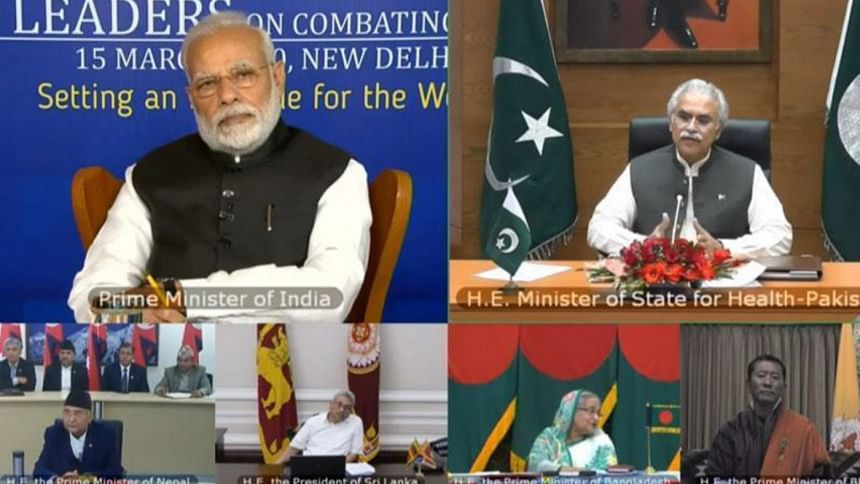Implications of coronavirus for regional and global cooperation

As the coronavirus pandemic continues marauding the globe, flattening developed and undeveloped, urban and rural, national and regional landscapes, blithely jumping across oceans and continents, one may be forgiven for thinking, somewhat desperately: is this the advent of Armageddon in our times? Being of fairly advanced years and acutely conscious of my own high vulnerability, my mind lapses into fantasising. Several hundred years or more from now, if homo sapiens survives that long, our progeny may probably recall today's time and events in a mythical legend, of the union between a Serpent and a Bat that spawned a hybrid creature of such malevolent nature that it threatened to wipe out, almost, all humanity before forcing saner and wiser elements among their ancestors to come together to combat and overcome this monster—at least, that is how I would fervently hope that yet-to-be-born legend to conclude, unless this scourge succeeds in its rampage of annihilation so completely that there will be no legend at all. However, enough of this morbid fantasising.
The novel coronavirus that causes the ailment COVID-19 (Corona Virus Disease 2019) has brought the mighty to their knees. Official statistics on the numbers of people afflicted, in varying stages of treatment or quarantine, or dead are coming in on a daily, even hourly basis. Teams of scientists are said to be working, across the globe, to decipher the genetic composition of this virus and find an effective antidote against it. This virus is thought to mutate rapidly, adapting to new circumstances and hosts, almost as if the creature thinks and anticipates defensive reactions to it. It afflicts people of all ages, but people 60 years or older are the most vulnerable. It is difficult to detect in early stages, multiplies exponentially, and spreads both horizontally and vertically.
This pestilence has already had a devastating effect on the global economy. China's hitherto robust economy, the second largest globally and very powerful (in the sense of giving political heft to its international relations and ambitions that aspire to match that of the United States'), practically came to a grinding halt, disrupting supply chains on which manufacturing in other parts of China and countries across the world were dependent for essential components. China's GDP, according to some initial estimates, will have lost around 4 percent, a most palpable hit. Imagine how that will translate to the global economy of which it is a highly important and integral part.
The advent of COVID-19 on the global scenario at this juncture also has had some telling political impacts and will likely have more consequential effect on many countries, domestically and beyond. Let me focus here primarily on our own region. For Bangladesh, its rearing its head at this time immediately had two consequences: on the downside, it forced the government and the people to drastically scale down or almost cancel many of the festivities and gala events planned to celebrate Bangabandhu's birth centenary on the very eve, so to say, of their commencement; on the "positive" side, it also saved the government from a very embarrassing political situation vis-à-vis India—it enabled putting off the impending visit of Indian Prime Minister Modi against which quite a widespread and vociferous opposition had been rumbling under the surface. It enabled both sides time to stabilise and reset relations on a happier and more palpably productive note at a more opportune time. For Mr Modi and his government, it provided a huge and most timely distraction from his festering domestic problems, economic and political, and gave him an opportunity of repositioning himself in a regional leadership position. In short, the appearance of COVID-19 on our regional shores did something which is nothing short of startling—but hugely to be welcomed.
Keep in mind how India, since the advent of the Modi government in 2014, has been steadily upping the ante in proclaiming the death of Saarc as a viable vehicle for regional cooperation. Beginning to realise, if not entirely perhaps but certainly to sufficient extent, that this novel coronavirus respected no man-made borders or human relationships, he had the gumption and sagacity to call for a Saarc heads of states and governments meeting urgently to discuss ways and means to tackle the challenge effectively. It was startling because it was Mr Modi who had led the move to oppose the summit in Pakistan scheduled for November 2016 after the Pakistani inspired attacks on Indian army camps in the Kashmir region; and it was now Mr Modi himself calling for such a summit, albeit a virtual one through video-conferencing. Pakistan participated, although with its PM's Special Assistant for Health Mr Zafar Mirza representing the Pakistani PM. Even though this was a virtual videoconferencing summit, taking place on the Ides of March, each head of state or government or high representative was assisted by a full accompanying delegation. The summit was commendable, displaying a hitherto unseen unanimity on several counts: that this crisis affected all equally and had to be challenged collectively, collaboratively; and that a body under the Saarc Secretariat's ambit should be convened immediately to discuss all aspects of the crisis and suggest measures to the member states. It was significant that Mr Modi, declared immediate unilateral contribution by his country of USD 10 million for undertaking mitigation measures required by any member state, no exceptions.
I have long argued, since the mid-90s, that what had held back Saarc from engaging in meaningful collaboration had been principally the sub-continent's tragic legacy of internalising the enemy within the region, the newly emerged entities regarding each other as enemies. It has been my conviction that the only way of moving the huge beast of Saarc forward was to try and prod one of its legs to move forward first; that might induce the other legs to also move—in other words, try and get sub-regional cooperation going as the first step, starting with the BBIN configuration.
Exactly a decade ago in 2010, at a conference in Colombo on a futures exercise on what nontraditional security (NTS) threats the South Asian region was likely to encounter in 2025, I had posited that obsessed as we all had been on fending against traditional security threats, real or imagined, from each other, we had overlooked that at the turn of the twentieth century numerous NTS threats had emerged that far outweighed any traditional security threat. I had identified these as being overall ecological and environmental security, food security, water security, energy security, employment security, health security, and security against unexpected wildcard events such as disasters from natural phenomena or disease pandemics. I had also asserted that all governments would have to collectively evolve regional mechanisms for meeting these challenges. Foremost among these regional institutions would have to be the establishment of an umbrella body with supra-national jurisdiction and mandated pooled authority, which I called the South Asian Regional Ecological & Environmental Security Authority (SAREESA), under which would be six sectoral cells to deal with food security, water security, energy security, employment security, health security, and environmental protection and security against wildcard events like devastating tsunamis, earthquakes, pandemics, etc., respectively. My concept of SAREESA is somewhat like Saarc in composition; but there the comparison ends. It is much more than Saarc, dynamic, with pooled sovereignty and real authority to make and enforce decisions for the collective good. But perhaps here too, like in Saarc, we may have to get one leg of this envisaged beast to engage in locomotion first, creating the logic for moving towards the other areas, step by step.
There is nothing like a good common existential threat to all of us to make us focus on that threat, to collectively and in concert endeavour to combat, contain and overcome it decisively. Voila, suddenly, entirely unexpectedly, we now have that external enemy, the COVID-19, which has already most tellingly demonstrated, in its most insidious way, its perilous propensity for replicating, mutating, propagating and attacking, making no distinction whatever among race, class, caste, religion, gender, nationality and geo-spatial location. We are all today confronted with a very dangerous pandemic that could pose an existential threat to governments, regimes and peoples across the region in yet unimagined ways.
The virtual video-summit of March 15 and its yet tentative, but nevertheless very important, decisions may yet prove to ourselves, convincingly, that cooperating together we can overcome all such NTS threats. The question is, will the suggestions accepted by consensus induce us now to move forward proactively, quickly? Or shall our peoples have to face near annihilation and a regression to a devastated Hobbesian state like Europe at the end of World War II, to realise the unimaginable costs of non-cooperation? I certainly think, not. In fact, perhaps the appearance of COVID-19 already seems to have spurred the leaders of China, Japan and South Korea (all states and peoples with not exactly always the most cordial relationship with each other) to hold a similar videoconference to discuss how to collaboratively tackle this malevolent crisis urgently. Mr Trump now may also be induced sufficiently in coming days to pedal back on belligerence, domestically and internationally, to focus more on making love, not war!
But let me not get ahead of myself here. I shall be content if only we South Asians can demonstrate that we can, indeed, turn a new leaf and embark on a new chapter of collaboration. Let us commence, now, by working together against this first major NTS threat. It just might open our eyes to discover that there is more that binds us together than what divides and sets us apart.
Tariq Karim is a retired ambassador and currently Senior Fellow at the Independent University.

 For all latest news, follow The Daily Star's Google News channel.
For all latest news, follow The Daily Star's Google News channel. 



Comments